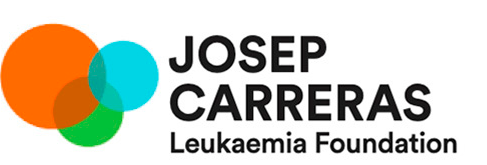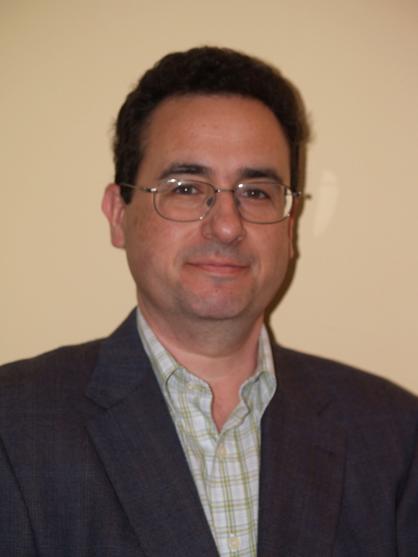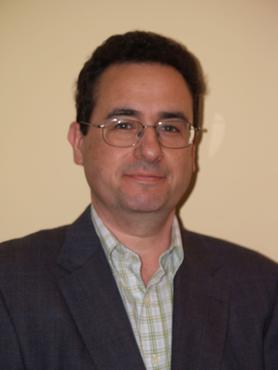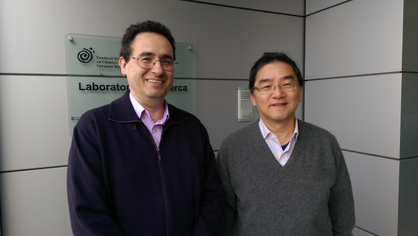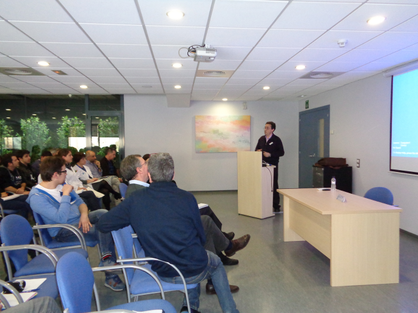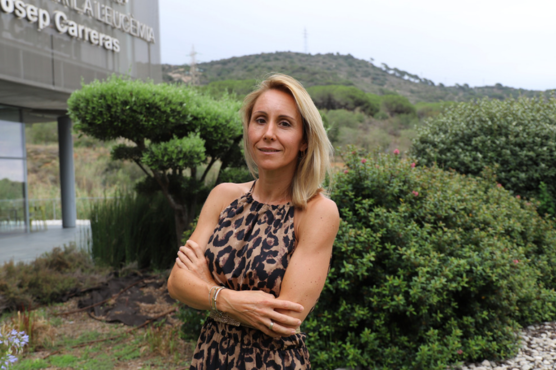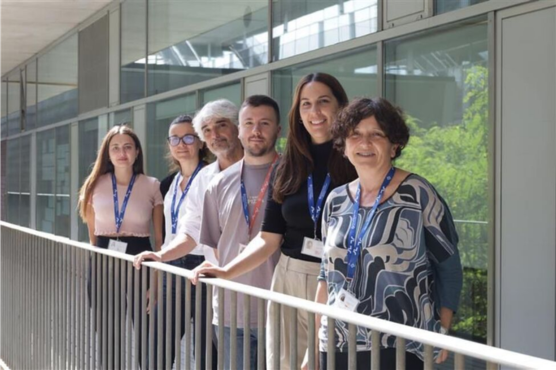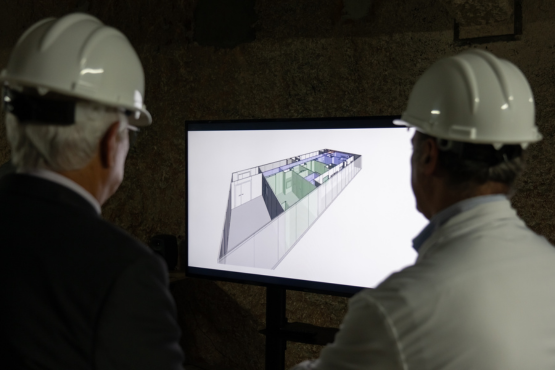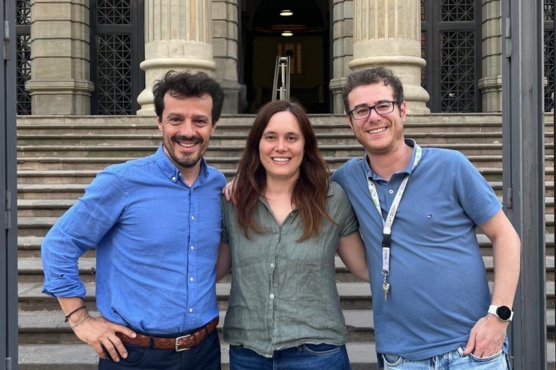“There are many challenges. Obviously the main one is to expand the success of CART19 to other CARTs, especially for lymphomas. It is also important to control their side effects and, as in all complicated and expensive therapies, another important challenge is to find a way of making them available to everyone who needs them without that availability depending on the financial resources or location of the people concerned.”
Today we have the great pleasure of welcoming Dr. Manel Juan, head of Clinical Immunology of the Barcelona Hospital Clínic Immunology Service, to the Catalan Institute for Oncology/Germans Trias i Pujol Campus of the Josep Carreras Leukaemia Research Institute (IJC).
Dr. Juan has led a symposium at our centre entitled, “Our experience of a CART19 approach in Barcelona, or CARs for anti-tumour immunotherapy”.
Dr. Manel Juan qualified as a doctor from the University of Barcelona, he is a specialist in immunotherapy and is also qualified in medicine and surgery (Barcelona University). He sits on the Council of the Grupo Español de Terapias Inmunológicas en Cáncer (Spanish immunological therapy for cancer group). He is the president of the Comisión Nacional de la Especialidad de Inmunología (Spanish immunology committee). + info here
When he is not working Dr. Juan likes, above all, to spend time with his family (not enough time and for a long time), to be with friends, go to the cinema and travel.
Today we want to ask him a little more about the current challenges facing immunology.
● Dr. Manel Juan, there has been a lot of talk recently in the media about immunotherapy. How would you define this treatment? For what kind of diseases is immunotherapy most appropriate?
Immunotherapyis no more than treating diseases with one or other of the components of the immune system, which in fact is to treat the entire immune system since all its components are interrelated and in equilibrium with each other. Immunotherapy is as old as immunology itself, and given that Jenner’s smallpox vaccine is considered to be the beginning of immunology as a discipline, it is without doubt immunotherapy.
In fact, the disappearance of a disease such smallpox is immunotherapy’s great success and there is nothing else to compare with it. What the media have been talking about recently is anti-tumour, or anti-cancer, immunotherapy because therapies for cancer have been introduced that are based on the immune system and they have a rate of success that has not been seen with many other strategies. It is a paradigm shift and represents a great hope for many people who can see, not only a cure for a disease like cancer, but that this might be achieved at “low cost” in terms of comparison with the side effects caused by chemotherapy and radiotherapy, which we all know can be devastating.
Immunotherapy is indicated not only for the treatment of cancer and infections (going beyond vaccines) but also for autoimmunity (diabetes, celiac disease…), inflammatory diseases (arthritis, lupus,…), allergies and for transplantation (in order to avoid rejection). And seeing as the immune system is fundamental for the organism’s equilibrium, or homeostasis, immunotherapy can also be indicated for diseases such as atherosclerosis, brain damage and even degenerative diseases such as Alzheimer’s.
● What kinds of immunotherapy are there at the moment?
Immunotherapy is either passive or active. Active immunotherapy implies inducing an immune response in the patient; it is what we know, thanks to Jenner’s strategy, as “vaccines”, the virus obtained from cows. So there are vaccines against infections, but also against cancer through various strategies which perhaps culminate with the use of dendritic cells which, having been obtained through ex-vivo techniques, induce responses that control the tumour. This has led the Food and Drug Administration in the USA and its European equivalent, the European Medicines Agency to approve the first cell therapy for prostate cancer.
Passive immunotherapy implies introducing into the patient, more or less directly, the element from the immune system that is to have an effect. The use of monoclonal antibodies (biological drugs) is the most usual strategy, but the most attractive strategy is cellular and employs plasma or effector cells, natural killer cells and, above all, lymphocyte T-cells. Amongst the lymphocyte T-cells, the use of tumour infiltrating lymphocytes (TILs), which expand ex-vivo, has shown their capacity to eliminate tumours and to produce effective anti-viral responses.
Regulatory T cells, for their part, can also control autoimmunity or transplant rejection. In fact, the allogeneic potential of lymphocyte T-cells is important in eliminating certain post-operation bone marrow transplant leukaemias.
Finally, the possibility of genetically modifying lymphocyte T-cells with the introduction of receptors against tumour antigens has revolutionised the field with anti-tumour responses of more than 90% in some cases, many of them long lasting. Now they are the chimeric antigen receptors or CARs (the receptor is based on the ability of the antibodies which are modified to generate a “chimera” capable of directing the cytotoxic response of the lymphocyte T-cells), but then come the specific T cell receptors (TCRs)… Whatever the case, the chimeric antigen receptors in lymphocyte T-cells, or CARTs, are already a therapeutic reality for B-cell lymphoproliferative syndromes, with very powerful results with similar, but not identical, constructions.
● Over the last days we have heard about a specific kind of immunotherapy called chimeric antigen receptors in lymphocyte T-cells, or CARTs, for the treatment of different kinds of cancer and tumours of the hematopoietic and lymphoid tissues. What does this therapy consist of?
As I commented in my answer to your previous question, CARTs are a kind of passive anti-tumour immunotherapyin which thepatient’slymphocyte T-cells are modified with gene therapy so that they express a receptor capable of recognising a molecule in the tumour’s cell membrane (one which is characteristic of the tumour) so that the lymphocyte T-cells are activated, become cytotoxic, secrete cytokines, proliferate and remain inside the patient’s body. These lymphocyte T-cells with the chimeric antigen receptors (CAR) introduced ex-vivo, are expanded to be reintroduced into the patient. Once they are inside the patient’s body these lymphocytes recognise and kill tumour cells and they remain inside the patient, patrolling around the body, and if they find other tumour cells on which to act, they kill them.
Dr. Juan accompanied by Dr. Fumiichiro Yamamoto, lead researcher of the Immunohematology Group at the IJC Catalan Institute for Oncology/Germans Trias i Pujol Campus.
● What is the difference and potential of this kind of immunotherapy in comparison with other kinds that exist at the moment?
The difference is that it has been used and it is successful: specifically for B-cell acute lymphoblastic leukemia the CART19 (CART against molecule CD19, characteristic of B-cell lymphocytes) have enabled refractory patients, that is to say patients who had stopped responding to chemotherapy, to respond to these CART19 in 85% of cases. We are talking about more than 200 people being treated today around the world. Furthermore, there are adult and paediatric patients who, four years later, no longer have leukaemia. But the potential goes much further than these tumours and we can expect to see an explosion of proposals with this CART structure.
● What are the upcoming challenges facing the study of this new CARTs therapy?
There are many challenges. Obviously the main one is to expand the success of CART19 to other CARTs, especially for lymphomas. It is also obviously important to be able to control their side effects since these can have an important effect on patients (cytokine release syndrome, a sign of anti-tumour response, has already led to the deaths of at least three patients) while in some cases there are long-term side effects (the disappearance of normal B-cell lymphocytes and agammaglobulinemia which requires IG infusions). And, as in all complicated and expensive therapies, another important challenge is to find a way of making them available to everyone who needs them without that availability depending on the financial resources or location of the people concerned.
● In the talk you gave you speak of your experience with CART19 experimental therapy which has produced hopeful results in acute lymphoblastic leukaemia (ALL), the most frequent childhood leukaemia.
As I have already explained, the CART19 are CARTs against the CD19 molecule and marker for B-cell lymphocytes and have already been successfully used with B-cell lymphoproliferative syndromes (leukaemias, lymphomas and even myelomas).
As a therapeutic proposal CARTs are consolidated; more than 200 patients can vouch for it. What is under study is how to confront the challenges that exist. In our country Novartis will shortly include a few patients in an international industry trial (CTL019) and in a few months we hope to launch a clinical trial with our own CART19 from an “academic” standpoint (Hospital Clínic, University of Barcelona and the IJC).
The next step is to make CART19 a therapeutic reality in our country and to solve the challenges we commented on before.
● The Josep Carreras Foundation has established a specific research centre for leukaemia and other malignant blood diseases, the Josep Carreras Leukaemia Research Institute (IJC). What effect do you think this will have in the scientific world and for society?
The IJC is an institute that brings together some of the researchers working in hematology. In our case we are collaborating with the IJC from the Hospital Clínic and August Pi i Sunyer Institute for Biomedical Research (IDIBAPS). Our hope is that, between us all, we will be successful.
Thank you very much!

